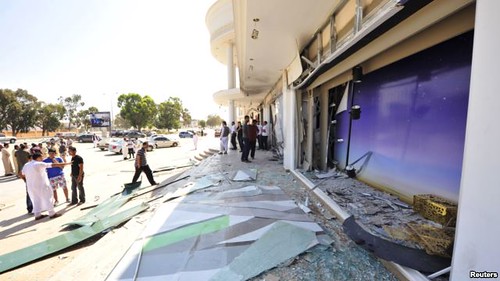
Benghazi attack at Marks & Spencer store. A wave of political assassinations continue two years after the counter-revolution against the Gaddafi government., a photo by Pan-African News Wire File Photos on Flickr.
August 08, 2013
Rights Group: Wave of Political Assassinations Paralyzes Libya
by Selah Hennessy
Human Rights Watch [HRW] says more than 50 people have died in a broadening wave of apparent political assassinations in the cities of Benghazi and Derna in volatile eastern Libya. Analysts say the state has been unable to reign in the violence that has taken place during the two years since Libyan leader Moammar Gadhafi was ousted in a Pentagon-NATO war of regime change in 2011.
The rights group said two of those killed were judges and 44 were serving members of the security forces. Most held positions in the Gadhafi government and at least six were high-ranking officers during his leadership.
Hanan Salah, a Libya researcher at Human Rights Watch, said, “In none of these cases have the law enforcement agents, the criminal investigations department or the police been able to conclude any of these investigations.”
People interviewed by HRW said law enforcement agents have not investigated at crime scenes, summoned potential witnesses, or provided information to the families about their investigations.
Libyan officials could not be reached for comment. Law enforcement officials in Benghazi, though, have said the unstable security situation creates major obstacles to their investigations and they lack the means to summon witnesses without the use of force. They also say they do not have access to sophisticated tools for investigation, such as DNA testing.
Salah said the government has shown no political will to resolve the situation. "The weakness of the government and the lack of means for these law enforcement agents to conduct their jobs, to do their investigations, is the main cause for that."
No group or individual has claimed responsibility for the attacks.
Shashank Joshi, a Libya analyst at the Royal United Services Institute research group in London, said the situation has grown steadily worse since the overthrow of Gadhafi and shows little sign of improving. "At this point it is difficult to see how the state could do more without a more fundamental change in the political circumstances - and that is, all groups respecting the legitimacy of the central state."
He said the law enforcement system is not cohesive enough to apprehend suspects from far-flung parts of the country where they might have fled. Also, because of porous national borders to the south, suspects can easily flee the country.
Libya’s prime minister has said he will re-shuffle his government to try to tackle instability in Benghazi.
On top of the assassinations, the city has recently been hit by bombings, public protests, and a mass jail breakout.
Joshi said the government needs to rein in the situation now or risk state collapse. "I think they have a strong incentive in showing themselves to be competent. Because the more they allow this to continue, the less capable they are, the more they lose legitimacy and the more they lose ground to militias."
The research carried out by Human Rights Watch shows a peak in political assassinations in Benghazi in the second half of 2012, and then again in January and July 2013. It says most of the killings have been in central and eastern Libya.
http://www.voanews.com/content/human-rights-watch-says-wave-of-political-assassinations-paralyzes-libya/1726303.html
No comments:
Post a Comment